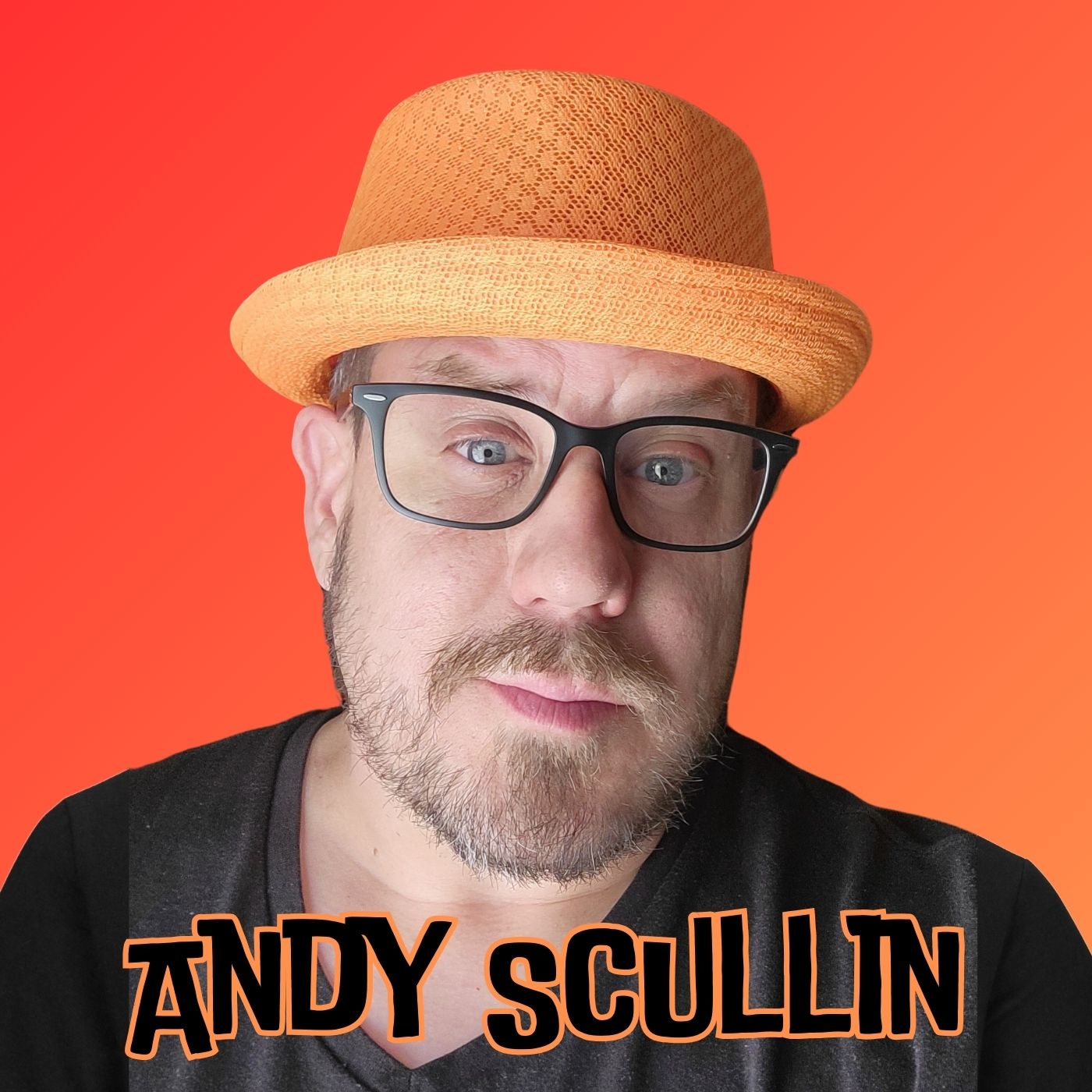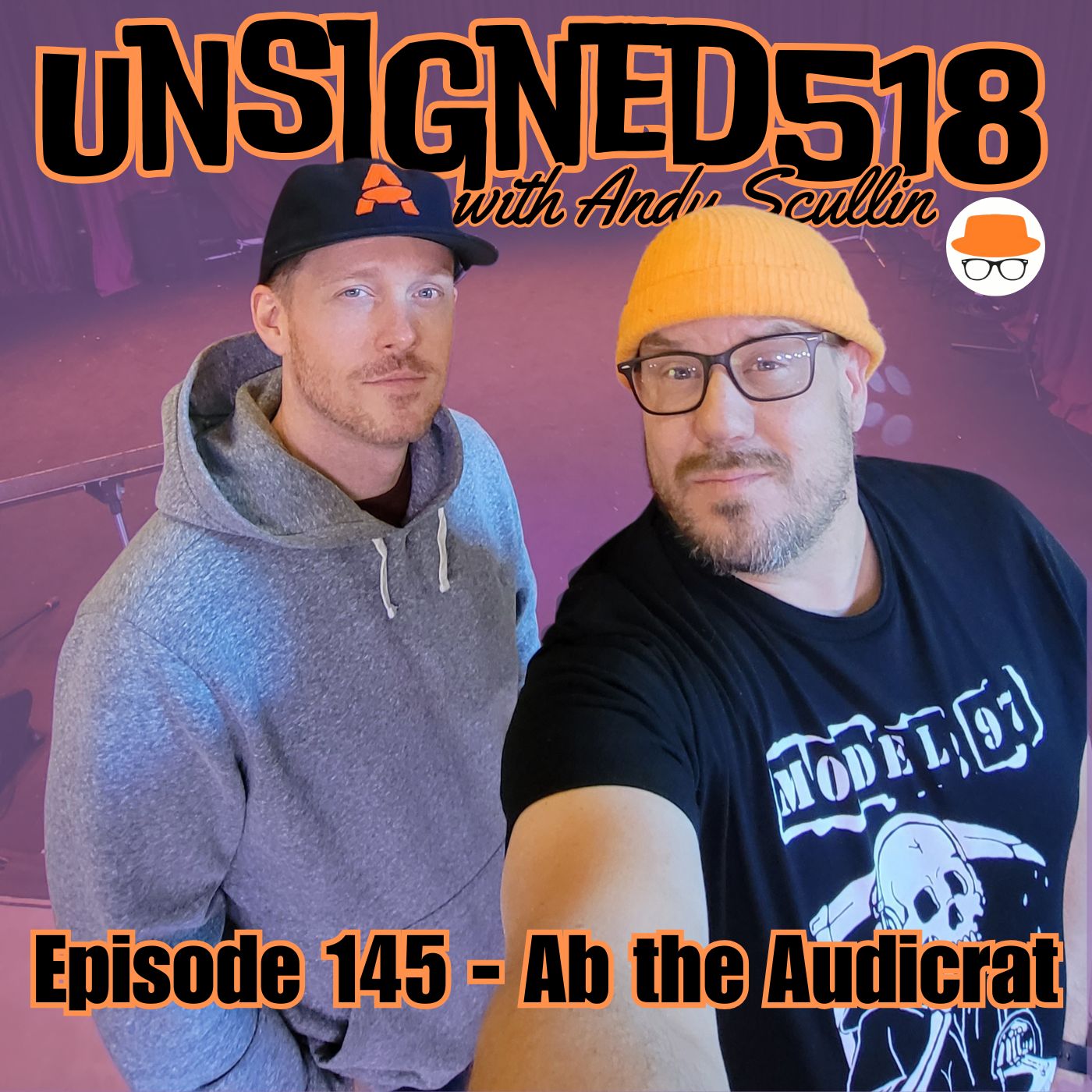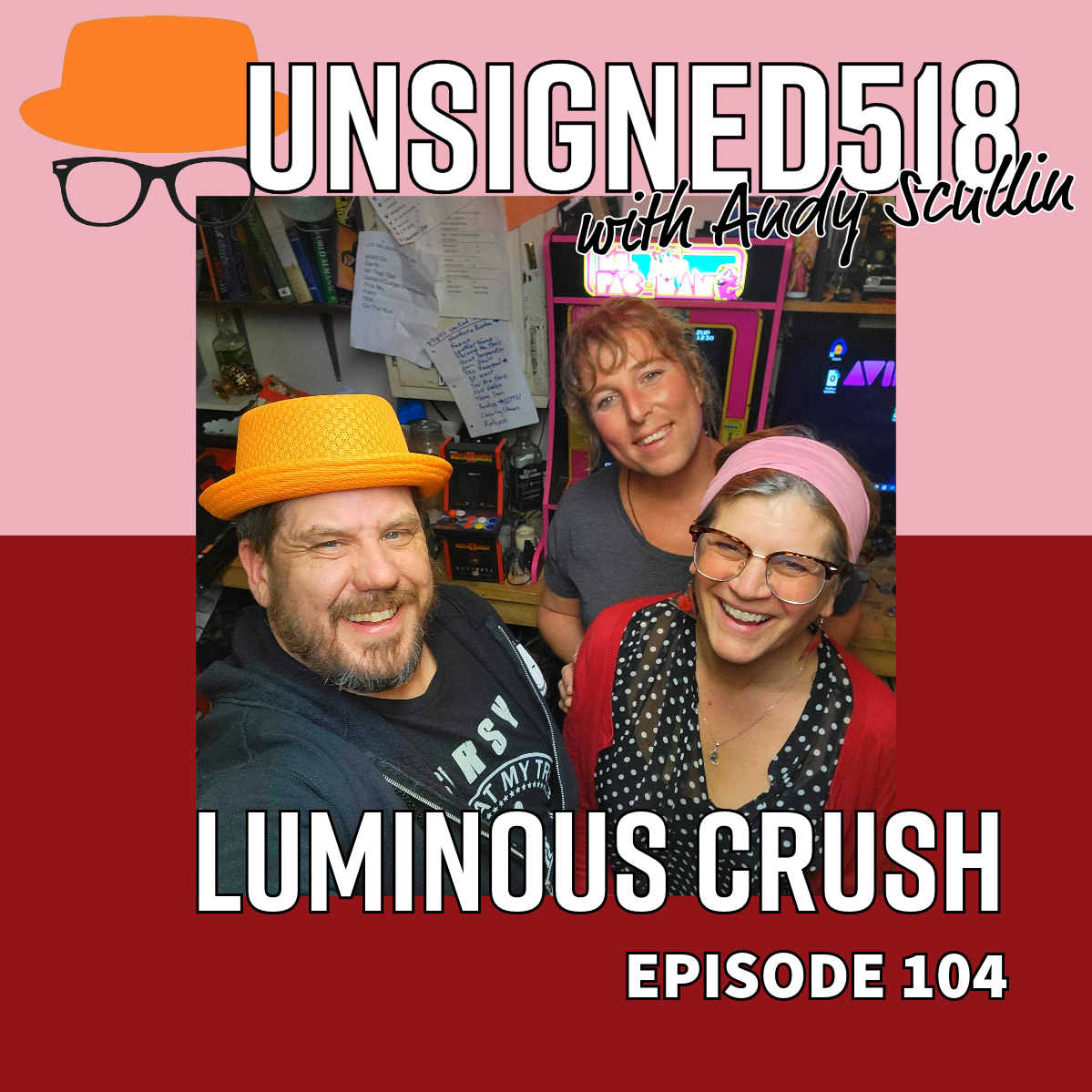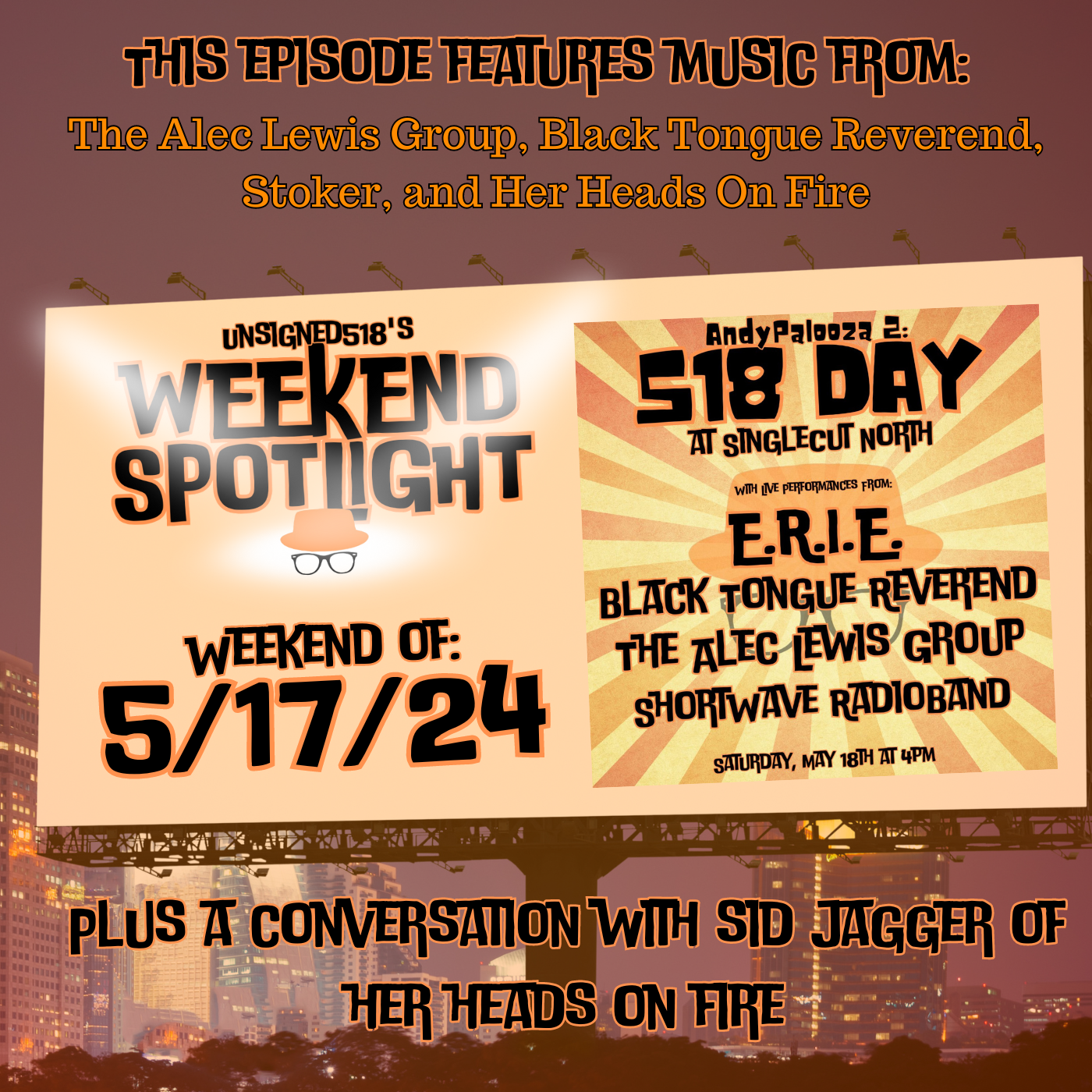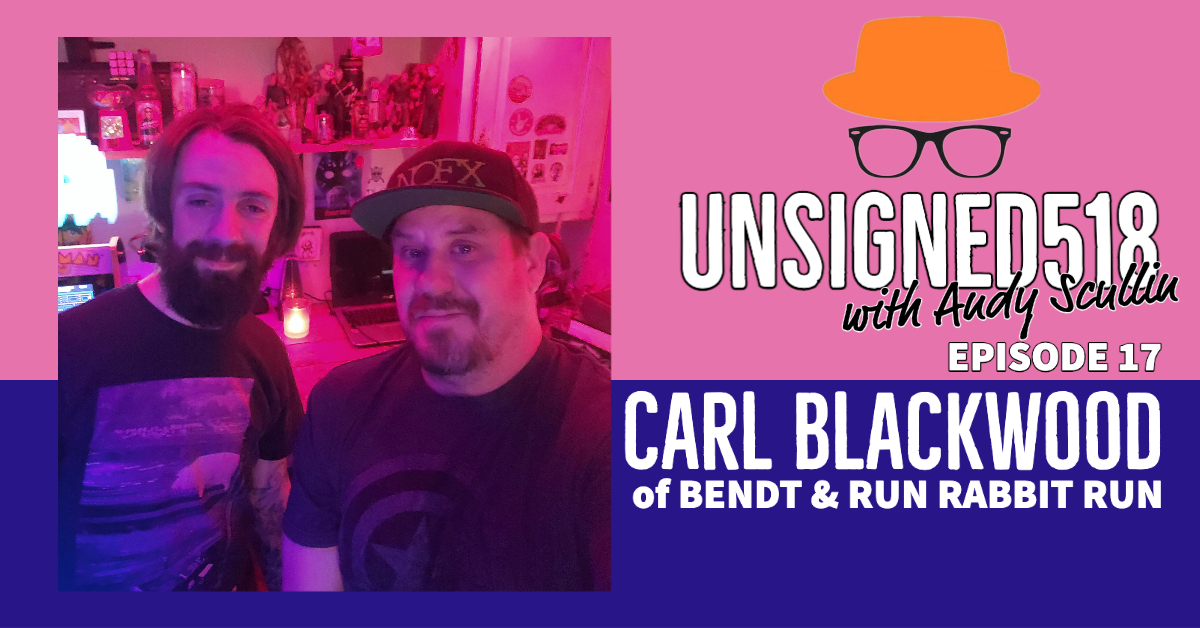[00:00:01] Speaker A: He was born on a Saturday in.
[00:00:03] Speaker B: 73 he loves park rock music.
[00:00:05] Speaker A: Fighting the 13th, jamming in the dazzle. Rocky now on the bench guitar with a short whip radio back his motherfucking Andy scolding. Look at motherfucker cuz here he comes. Andy scrolling his arm.
[00:00:26] Speaker C: Welcome to unsigned 518. I am here with Ab the autocrat. How's it going, Mandev?
[00:00:31] Speaker A: What's going on?
[00:00:33] Speaker C: Not a lot. It's pretty cool. Like, we're sitting in the drive hive and there's the hustle and bustle of a show. There's a show tonight and that's kind of why we're here. I'm the, I'm hosting the Q and a section of the show tonight, so I had to move my podcast here. So.
[00:00:51] Speaker A: First time here. It looks amazing.
[00:00:53] Speaker C: Yeah, it's a fun place. A lot of fun already. But, you know, we're not here to talk about me and or the jive hive. We're here to talk about Ab the autocrat. So before we actually get into it, I want to.
I mean, a lot of people have seen, like, I've been tagging you in all the posts, and that's because formative years, the instrumental version I've been using as my bed music when I talk on the weekend spotlight. And the way that came up is I wanted, like a bed music that was, you know, something smooth and, like, had some feel and wasn't just a beat. And I had asked you, you know, hey, how, you know, could, could I commission like a beat or whatever? And you essentially, like, gave me a song to use and. And it was like the perfect, like, the perfect fucking song. So I guess before we get started, I want to thank you for that. Of course, that, that beat is great. I've been using on everything. On all the. Yeah, I've been hearing Instagram reels and everything. And it's like when I thought of a music that I wanted, that's like, basically what I had in mind, so it was fucking perfect. Yeah. But anyway, we're going to go back and I guess, tell the story of ab, the autocrats, how you got started in music leading up to kind of where we are now.
[00:02:19] Speaker A: Yeah, sure. I mean, I'm 39 now. I started when I was probably around 1314.
Very humble beginnings. I mean, I grew up in Albany, Whitehall Road, a bunch of friends that I grew up with. We were always big in listening to music, always big on hip hop. And before you know it, everybody started rapping, freestyling, battling, like, you know, just all that fun stuff in the park. And then a couple of my friends had keyboards and even I had like a keyboard or two just from like a Christmas present, like, you know, real, real rough stuff. And. And then sooner rather than later, somebody got a karaoke machine. Then we started recording. And it's funny, in the early days, I actually was rapping well before. I was like making beats. I wouldn't say well before, maybe like a year before or something like that.
[00:03:05] Speaker C: But in young years, that's like forever, right?
[00:03:08] Speaker A: Yeah. And it's funny even way back then, like probably 8th grade, we. Excuse me. We used to actually search for the end or the beginning of songs where we could loop a beat because we didn't have, like, we didn't even have like a record player, a sampling, like a sampler, any of that stuff. So anywhere we could find something that had a beat, that's how we first did it. We just had a tape machine and we'd record 10 seconds and then we'd go back to that part in the cd, record the 10 seconds. And it was. It was hilarious, like looking back now, but from there, you know, from there, then we started incorporating keyboards and we started making beats. And one thing led to another.
My first keyboard that actually had some sort of multitrack capability was from Radio Shack. I forget what the name of it was. It was either Optimus, something like that. But that's what really set it off. So, like in 9th grade, me and my buddies, my buddy had a very similar keyboard and it allowed us to make fuller songs. But even back then, there wasn't any loop capabilities. We're sitting there playing drum beats with our hands on the keys for three minutes and then the bass for three minutes. And it was very humble beginnings, which was very good for us because it really gave us a bass that especially now not. Nobody really has to start like that. I mean, there's a lot of tools now. Sampling is easier than ever, which is a good thing, but back then we just didn't know any of that. So there was pretty much four years of that in high school. And I decided, I want to go to school for music. And I went to Oneonta with a bunch of my friends, a couple rap friends, and it was fantastic. Learned a lot there. And basically from that point on, I really converted straight to digital. I was telling you, before I had a Dell computer, started using a couple programs, fruity loops, Sony at Sony's acid. And that's when I really started sampling. So that's when I started getting into that whole world sampling, like, anything I could, if it was a commercial, if it was a radio, radio station, anything I can get my hands on. And it's funny because back then, I never was a record guy. Like, I didn't have records and vinyl and, like, sampling off, you know, off of records and into a sampler. Like, I just had my Dell computer. So it was really humble beginnings on how I sampled too. And I did that for a couple years then. I've been using what I use now ever since my junior year, which is reason and pro tools. So that's pretty much what I've been using this whole time since then. And, I mean, there's a lot of, you know, ups and downs, ins and outs with who I've worked with and. And a lot of releases I put out. But basically since that time, which has been, like, 2005, been using the same stuff and just kind of upgrading a little bit here and here and there. And here we are many years later.
[00:05:41] Speaker C: And, you know, when you made that shift from doing, like, hip hop vocals and just focused on, like, sampling and making beats, was that something that was just like a natural cause when you said, you know, when you went back talking about, like, the humble beginnings of, like, having to, you know, fucking take things, whatever you can get through your dell computer like that, to me, it reminds me of what we were talking about before we got recording with me and audio editing. Like, I literally was using a razor blade and tape.
[00:06:12] Speaker A: Yeah.
[00:06:13] Speaker C: And then it's amazing when the, you know, pro tools came out, I was like, holy shit, it's like, amazing, like, having that caught that edge of the technology shift.
[00:06:25] Speaker A: Right.
[00:06:25] Speaker C: I guess. Do you think that gave you a leg up to.
[00:06:28] Speaker A: I do think so. And I was at a point right when I started, like, right when I was in college, I was at that technology shift very, like, last leg of kind of mainly analog going to. Going to the digital world. And, yeah, I look back and it is crazy how I was right on that cusp. And it did help because even for the little things we did do with analog gear, it did give me, I think, a leg up when I got to college because I met a bunch of people that really were fresh into music their freshman year. Like, they didn't really pick up anything before then. So they're kind of learning just the digital world. So having that background and, you know, learning how to play, at least teaching myself how to play keys, stuff like that, definitely gave me a leg up. I'm quite sure of it. Yeah.
[00:07:10] Speaker C: And when you say, like, the playing the keys. Like, the one thing I noticed about, like, a lot of the beats is that it has that musicality to it that, I guess, extends beyond a sample. You know, is that. Were you trained on keys, or was that just something that you kind of learned through having a keyboard?
[00:07:29] Speaker A: I pretty much was, like, self taught, and not even in the best way. I mean, when you're self taught, you tend to have very bad habits. Which I kind of knew from the beginning because I couldn't read music. None of that stuff. But when I started taking classes in college, the theory side of it came very natural to me. Like, when I'm taking music theory classes, like, it all made sense in a way where it would not have all made sense had I not have bought a keyboard and just kind of. But there was something about it that did click early on. By no means am I a piano virtuoso. I can't look at a sheet of music and play and play like that. But I could hear things and play and interpret. So going into that world, that definitely translated very well. But I also love sampling. So I kind of started doing both for a while. And then there's been years where I'm just heavily sampling. And then there's months that come in where I'm kind of. But there is some blend of that in a lot of what I do. Like, I'll play the bass lines. I'll program all my drums. Sometimes I'll mess with some drum breaks. But then, you know, any type of, you know, synth overdubs, things like that. Like, I. Yeah, I tend to work those in, too. So it's. I try to do the best of both worlds. Sometimes I go one way or another, though.
[00:08:32] Speaker C: And when you're, like, constructing a beat, like, just hypothetically, like, does it start with a beat? Does it start with a synth loop? Like, where does it. Where does it start and get to.
[00:08:43] Speaker A: For the longest time, it was drums. I'd always start with the drums. I just come up with a drum loop and then figure something else on top of that. Then over the course of time, especially when I'm sampling, I would kind of have an idea already of what I wanted to do. If I had a. A sample in mind, I would think of the drums, like, kind of ahead of time. So then I'd chop the loop up, have the loop chopped, and then kind of fill in the drums. And I did that for a while. And I've been really leaning away from doing that because I've found that it kind of like pigeonholes. You a little bit where you're kind of, you know, you're kind of surrendering to what the sample is instead of starting. Sometimes I found when I start with drums, like, it just kind of gives me a better creative path to kind of try different things and just have a little bit of a block of the drumbeat. It's kind of hard to explain, but I tend to start with the drums now. Sometimes it. Sometimes I'll have, like, a piano beat that I come up with, work around it, but mostly start with drums.
[00:09:38] Speaker C: And, you know, when you construct the song, do you usually have, you know, because a lot of the stuff, you know, we'll talk about who you've made beats for, who's, you know, rapped over your music. There's a lot of fucking people, like.
But, like, when you make beats, is it always, like, made of for someone in mind or do you sometimes, like, make a song that's just an instrumental and then maybe someone later might do vocals over it?
[00:10:06] Speaker A: Almost never with somebody in mind, per se. Now, if somebody hits me up and says, hey, like, let's collab, maybe I will gravitate towards certain samples that I could see somebody sounding better on than it had. I not known that. But a lot of the times it's just honest expression. I just sit down and whatever I come up with. And that's kind of how it is. But again, if I know I might be working with somebody, there might be some, like, genre or sub genre hip hop I might steer towards, but it's really just kinda. Maybe I can do better with having more purpose when I sit down, but it's really just kind of seeing what hits, what sticks the wall.
[00:10:42] Speaker C: Like, you make. You make the song and then, like, here's the song, and, well, you know.
[00:10:48] Speaker A: Sometimes I'll send, like, very finished, structured beats to people. Sometimes I don't. Sometimes it's very. Just two bar, four bar loops, but with the intention that I go back, like, I always like getting verses. Then when I get those, I'll go back, really restructure, maybe do an intro that I didn't put in the beat I gave them, and then just, you know, do breaks and all that. All types of stuff like that after. That's what I really like doing. So the people that know me, I try to, you know, they know ahead of time, like, this will get done. There's a lot more that'll get done to this on the back end.
[00:11:17] Speaker C: Right.
[00:11:18] Speaker A: I found that to work a lot, too, because the simpler the beat is for somebody to write and rhyme over a lot of the times when there's too much going on, especially for, like, rap, there's no room for the rapper.
[00:11:27] Speaker C: Right. Because the rapper's an instrument.
[00:11:29] Speaker A: Right.
[00:11:29] Speaker C: Right.
[00:11:30] Speaker A: So I try to be wary of that. I don't like sending people completely finished beats with everything done, but there's a structure. Sometimes it's, you know, 16 bars, eight bar, chorus type thing and draw outro. Sometimes not so much. It all depends.
[00:11:44] Speaker C: So I think we should probably play a song. Did you have one in mind that you want to play?
[00:11:50] Speaker A: Just put a single out recently with a good friend of mine, exquisite, called pushing 40, that I made the beat for.
[00:11:56] Speaker C: And this is actually not to plug, but I'm going to plug. This is on the official Metroland playlist, the hot singles in your area for September. Because we're going to put out every month like, a group of any genre singles that are released in that month. So go check out pushing 40 ab, the autocrat and exquisite. And right now we're gonna hear it. And then we'll be right back to talk with abdiota.
[00:12:22] Speaker B: How am I working over time? Still living, check to check got a bone to pick, ax to grind now with neck and neck bigger bat lit a cigarette early morning, still dark out forget that see my silhouette whatever my leather fresh purchase order on the 30 day credit net now I'll pull that better debt better get your pocket protector and your sweater vest nevertheless, I'm better than my competitors suggest 26 letter measurement test my masculinity non toxic but I'm heterosex accelerates my basement has the bench press and essential flesh and your album being trash, it's inevitable as death when I was twelve, I put my pedals in the test why? Cause they put the medals on my chest buy when you five eight you better look fly and talk sly caught a side eye from an awful guy marble guy with the Carl can I have that motherfucking thing? Go bang, bang, we're walking by while I put pastrami on the marble ride we could face off like Sammy souls and Mark McGuire yeah, that's right, the kids pushing forward, no necklace on, still looking Gordy yeah, that's right, the kids pushing 40, no necklace on, still looking Gordy let's see how New York feels I'm running with a flag on the field proceed to rip my tendon out of the heel conspiracy theorists like Diddy Neal I never saw him squeal he didn't sweat, didn't even get a minute yet it's just so jazz. I know, just don't bet. So Aaron Rogers thought he had division like a pair of binoculars, but that was ayahuasca talking. Enlightenment will be very obvious. He don't got it stake out like a pair of coppers.
[00:13:55] Speaker A: No.
[00:13:55] Speaker B: Erica Strata, what you wearing is embarrassing your mama. Mama comma. Damn, it comes too easy. If I tell you I'm the best in town, you gonna believe me? All my New York City?
Consult your local food court? You wanna taste the freebie? You got shooters, I got haitian voodoo dolls? And wish doctors who don't play? It's break graffiti, take a knee, you gotta take a l before you play? No, repeat? I'm rock and roll to the soul? I will beat on each street. Say less. No, please speak.
Yeah, that's right. The kids pushing 40, no necklace on, still looking Gordy. Yeah, that's right, the kids pushing 40, no necklace on, still looking Gordy.
[00:14:50] Speaker C: All right, that was pushing 40. Ab, the autocrat with exquisite. And you know how I came across you was actually through your social channel, your content, like you do the melodics Monday, you do a lot of tutorial ish videos. So I guess tell me a little bit about your social media focus, because me as a social media dude, I love that.
[00:15:13] Speaker A: Yeah, much appreciated. I mean, years ago, prior to Covid, probably 20 18, 20, 17, 20 18. I put out an album with a good friend of mine, Scheist. The end of 2017, and basically leading into 2018, I started seeing a lot of producers, specifically producers in hip hop, just make a lot of beat videos, for lack of a better word, just them making beats, posting them online, and just having a video of them doing it. And I would see people gain a lot of steam, and I was just kind of sitting back and watching, and I'm like, I think I could do this better than this person or different than this person or anything I could do. I was just kind of racking up ideas, and then it got to be like a year, and I'm like, I got to just start doing this. So I went through a rebranding stage a couple years ago. I used to go by absolutely. And it was just very generic of a name, and I wanted to stand out a little more. Especially it was right when I was going to be putting all my stuff, finally on streaming, streaming services. Before that, it was just bandcamp. So as I was doing that, I was gearing up for content, and then Covid happened. So it kind of was the perfect storm for me to really just dive in, use my phone as a camera, started learning how to edit videos. I use lumafusion on my iPad and, you know, humble beginnings. Again with that. You know, I was really just kind of winging it and sooner rather than later, got a little bit better with the video editing and got even better with my mixing. Like, I had a new mixing wave of a ton of new things that I learned, really right before COVID and then through Covid, and a lot of it was just beat videos. And then I started to kind of switch up and do a lot more talking in the camera. And more recently, that's evolved to. Every week I've been doing what you said, melodics. Mondays, there's a company melodics that has. It's almost like a guitar hero from. For musicians, the notes go across the screen and you can either play with keyboard or a drum pad. And I was a big guitar hero fan, so I thought this would be a cool thing to just weekly do something like that.
[00:17:05] Speaker C: Right, right, Nick.
[00:17:07] Speaker A: Yeah. Love guitar hero.
[00:17:08] Speaker C: Yeah, we used to have. Me and Nick and our friends, we used to have guitar hero parties. Oh, it's the best fucking all the time.
[00:17:15] Speaker A: But it really is very similar to that. I mean, it's just notes going across the screen, and I just thought this would be cool. So I've been doing that every week and I still am doing some beat videos, but moving forward, I'm gonna be really trying to focus on YouTube. Long form content tutorials. Like we were saying before, it's a little daunting because long form content is just that much longer and harder to edit and time consuming, but that's the next step. And then breaking down clips for socials.
[00:17:42] Speaker C: So, yeah, I mean, it's interesting.
It's engaging in a way that sparks creativity, I think. You know what I mean? I can see somebody seeing your posts and being like, you know, almost how you said, oh, I can. I can do something different than that person. Like, I feel like that could spark something.
[00:18:02] Speaker A: I think that's great. I hope people can look at my videos and want to do better, like, in a competitive way. Like, I love that. Like, I think that's good for everybody.
But, yeah, it's. It's. It is the one of the best parts about it. Like, people like, hey, man, I started doing this because of this and because I was like that with other people that I'd watch. So that's. That's really the goal, just to build an. The community as big as you can, really.
[00:18:23] Speaker C: I'm like, there's room for everybody in every facet and, like, gatekeeping in any way?
[00:18:30] Speaker A: No. Yeah, I think it's kind of productive, for sure.
[00:18:32] Speaker C: Absolutely. Absolutely. Well, is there anything else that you want to throw in before we hear another tune?
[00:18:39] Speaker A: I don't know. Not specifically. I'm just excited to be here. Excited to, you know, like I was saying, I'm, like at the cusp of this new wave of content and stuff. And I think this is a good spot to be. To kind of, you know, maybe plug that and keep on the lookout for. Especially the YouTube stuff. But, yeah, we just get into the. Get in the song. Sure.
[00:18:57] Speaker C: And what are we gonna hear this time?
[00:18:58] Speaker A: So we're gonna hear the foundation also with my, my friend exquisite. And I did produce this one also.
[00:19:05] Speaker C: All right, well, let's check out the foundation. They'll be right back to wrap it up with ab. The autocrats.
[00:19:10] Speaker B: Let's get this out the way I voted get the jab that's what they say eradicated Covid had em sayin oh, shit, didn't notice with my bodega bars, man late, they staying open I got the bacon gone these guns are waving an ocean got the paid promotion got the nose dripper, drippin alligator poachin fish oh, you a bitch with an adult list lift, sip the tip with the coconut drip wife open the hip, fuck a stroke of the hip duly noted, keep the dually loaded lyin to myself like I'm fat and say I'm truly bloated doobie smokin'movie, quotin'situational, proceed with unruly focus burp shit half the way got the quote in little returns king compound can grow it gritty women, city twisting pretty kitten meth tap with the Philly lid Philly crystal city slicking I hate the phrases. Should be lit in it be hitting different hit you different, skinny dipping with some pretty women brick bop, brick bop, bounce pushing, they go calm knocking it down and bring the cranin round out around the town, around rake them, take them down for a pound, even an ounce hey, brick bop, brick bop foundation.
[00:20:15] Speaker A: Brick bop, brick box.
[00:20:23] Speaker B: Muffin top, hold the top barely holding up a top mutton chops looking like a mutt nuttin hot butter erupt fellas, shut the fuck up and punch a clock looking at her butt butt in the duck and I can passively aggressively leave go home, bust and nutt on my sock breaking down coke rocks and bubble snots yuck, whatcha got? Devil sells easy as hell, it never ends well laundering money, washing tongues like Denzel. You Looney tunes get hit in the head with n bells rappers are confused can't tell if they want to spend or sell fentanyl benadryl medicine attention is presently felt and that narcan what is readily available better be a prayer you'll be dead or be in jail and you truly won't if you believe you never prevail I'm not around, I'm papa swerving copy I'm not the person to rock a turban but my block is urban bourbon got you swerving ever since my cock was working in the twaddle virgins I'm an obnoxious person, I'm a box earthen nice chain, watch me snatch it off give me that. Cause you rap the saw white boy Asshara, he used to rap his ass off, but he never hit a nipple bag of black coughed his ass off knocking it down and bring the training round out around the town around like them take them down for a pound, even an ounce.
[00:21:46] Speaker C: Alright, that was the foundation ab, the autocrat with exquisite. And I want to thank you so much for taking time out of your day and meeting me here at the jive Hive. And you got to check out the jive Hive, which is a. And what you may not know, probably don't know, is the very first episode of unsigned 518 was on that fucking couch where you're sitting right now. And on Tuesday, this coming Tuesday, it'll be passed by the time this episode airs. But my 200th episode.
[00:22:19] Speaker A: Oh, wow. Is.
[00:22:20] Speaker C: Is hitting, if I count like all three of my shows, like the specials or whatever, but milestone. 200. 200 episodes. But anyway, not too shabby. Again, enough about me, but thank you so much. Before we go, like I do with all my guests, just want to give you a chance to say what I refer to as your gratitudes.
[00:22:37] Speaker A: Yeah, I mean, Jesus, where do I begin? Mom and dad, of course, they've been the best. They always have been the best and will be the best. My girlfriend Rebecca, she's extremely supportive. My brother, my nephews, his wife Katie, you know, my brother Dennis. I don't want to not say his name. And then, you know, a lot of my close friends, so many to name, it's really endless. But everybody knows who they are. I think when it comes to the music, I don't want to leave anybody out. But, you know, I got a lot of close people I make music with. Producers, rappers, engineers, even. But yeah, especially everybody that follows me on socials and reposts and like. And comment on everything. It really does mean a lot. And especially when really the world lives online now. You know, if that's, if that pertains to you, then much, much appreciate it all around. So.
[00:23:22] Speaker C: All right. Well, he is ab, the autocrat. I am Andy Scullen. This is unsigned 518. I'll see you on the road.
Unsigned 518 is produced and hosted by me, Andy Scullen. New episodes are available every week wherever you stream podcasts. If you'd like to help support show, please like and subscribe wherever you are listening. Or you could buy me a
[email protected]. unsigned 518 if you would like to advertise on the show, send me an email at unsigned five one eight mail.com. and to be a guest on the show, reach out to me through Instagram. Unsigned 518 take care of one another, and I'll see you next week.
[00:24:04] Speaker A: Andy Scarlet and Scullen.
